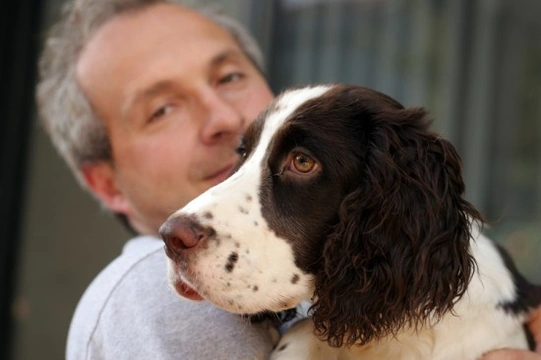
Reducing your Dog's Separation Anxiety
Dogs are celebrated for their loyalty to man, famously offering unconditional love and devotion to their owners. Many people would take their pet everywhere if they could, however there will be always be occasions when the family dog must be left home alone. Unfortunately, dogs may become overly dependent on their owners and experience significantly high levels of stress when they are left on their own. Their subsequent anxiety poses a serious problem, as it often causes them to act out in anti-social ways. Dealing with the consequences of separation anxiety can be incredibly stressful for dog owners - it is not only a challenging problem to solve, but may also cause tension with neighbours or result in costly damage to household items. There are many different approaches to dealing with separation anxiety; this article will help you understand what causes the problem, and how you can work towards solving it.
What is separation anxiety?
Dogs, like the wolves they descend from, are pack animals. They instinctively place themselves within the hierarchy of their "pack", and much of their behaviour is dictated by group dynamics and interactions. From the moment you bring your canine companion home for the first time, you will begin to develop a mutual bond that forms the basis of your dog's new world. He will come to rely on you for more than just food and care: your interactions with him will form the structure of his whole world. With this in mind, it is no surprise that some dogs may overreact to being left home alone. Your canine companion will not be able to understand why you are leaving home, when you will be coming back, nor why he cannot accompany you. Your dog will simply see you packing your bag or grabbing your car keys and assume the worst. Unfortunately, an inability to cope with your absence may cause your dog to behave inappropriately or anti-socially. Though canine instincts make your dog want to be around you as much as possible, extreme separation anxiety is not normal and may be indicative of an unhealthy level of mental anguish. You can help your dog and yourself by recognising the signs and acting accordingly.
What behaviours may occur as a result of separation anxiety?
From the moment your dog senses that you are leaving, he may lapse into a distressed state and begin:
- Whining or yelping
- Barking
- Urinating or defecating indoors
- Destroying or damaging parts of the house
Shortly after you have left his behaviours may intensify or continue until you come home. When you do return, your dog may continue to overact by greeting you in a hyperactive or over-the-top manner. A long time may pass before he is able to calm down.This cycle can repeat itself each time you leave the house, until you begin to take steps to correct your dog's behaviour.
What can I do to stop my dog from becoming upset when I need to leave him alone?
Every dog is different and you may need to find out what works for you through trial-and-error. However, it is important that you do not attempt to physically punish you dog for his actions - doing so can cause more harm than good, as he will not necessarily link his punishment with the negative behaviour.Instead, think of the process as a means of reframing the situation for your dog.
- Work on training your dog. Demanding obedience reinforces your status as the pack leader. If your dog is responsive to your commands, he is more likely to settle down when you tell him to sit or stay as you leave the house. You can work on developing a verbal cue to indicate you are temporarily leaving home; this will help him understand that as pack leader you can come and go as you please.
- Dogs like routine and predictability so try to work a sense of familiarity into your approach. When you are at home, play with and exercise your dog as much as you can so that he is less bored. Then, when you need to leave, lead your dog to a comfortable bed or crated area and provide him with stimulating toys or treats. This will help transform the negative experience of being left home alone into a relaxing time.
- Leave your TV or radio on when you are away, as background noise can help soothe anxiety.
- Do not reward bad behaviour with attention. Give your dog the cold shoulder by avoiding eye contact or reassurance in response to his wild behaviour when you return.
These suggestions are merely starting off points. With the help of a training guide, the approaches that prove most fruitful can be developed into a larger system to calm your dog in stressful situations.If your dog has severe separation anxiety, you may need to consult a specialist before or during the reconditioning process. Short of using drugs, there are several natural remedies on the market designed to help reduce stress. A chat with you vet may help you determine whether any of these products are right for you.
Are certain breeds more prone to separation anxiety?
All dogs can experience separation anxiety. Distressed behaviour occurs mainly due to overdependence and socialisation problems rather than any particular breed characteristic, though you may hear otherwise depending on your source. Some argue that certain dogs are hardwired for anxiety, however a dog's life experience will often be the strongest factor in determining whether or not it displays any troublesome behaviour. One dog may bond intensely with a certain member of their family and therefore become unhappy only if that person is not around; another may become distressed only if left in an unfamiliar place. In either case, a well-reinforced response to anxiety should help tremendously. Even traumatised dogs can improve if their owner's response is consistent and well-planned.



